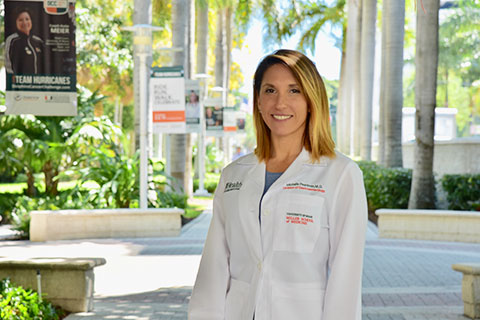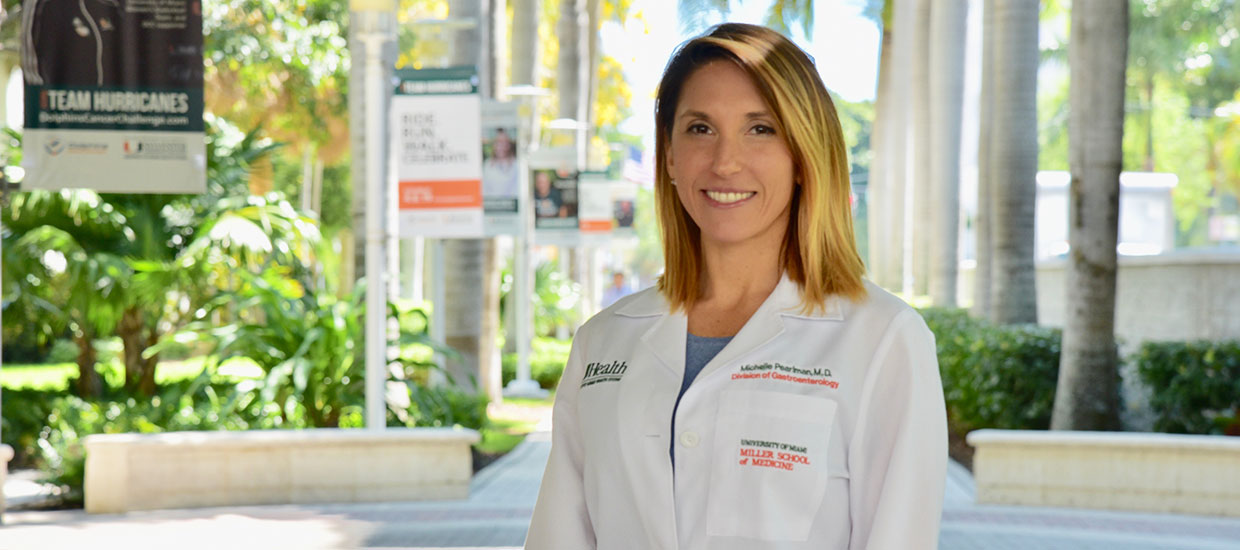Dr. Michelle Pearlman, B.S. '08, is on a mission to educate the community on the fundamentals of wellness and nutrition in a digital world. "To be a well-informed consumer," she said, "one has to educate themselves instead of blindly trusting the majority of information that is readily available on the internet, social media, television and magazines."
Dr. Pearlman and her twin sister Dr. Amy Pearlman, B.S. '08, who graduated with a major in neuroscience, chose the University of Miami because of its well-known pre-medical program. "We both really wanted to be in an environment that offered healthy outdoor activities all-year round and experience a setting that was quite different from where we grew up in Maryland.”
Learn more about how Dr. Pearlman found her way back to the U to pursue her passion:
What was your major when you were at UM and the educational path that you took?
I am a Physician Nutrition Specialist and board certified in Internal Medicine, Gastroenterology, and will soon be board certified in Obesity Medicine. I recently joined the Division of Gastroenterology at the University of Miami in 2018 as an assistant professor. I graduated from the University of Miami in 2008, Summa Cum Laude, with a major in Biology and minors in exercise physiology and chemistry.
I went on to medical school at Wake Forest University School of Medicine, completed my internal medicine internship and residency at The University of California San Diego, and most recently concluded my gastroenterology and hepatology fellowship at The University of Texas Southwestern.
When did you discover that you were passionate about wellness and encouraging others to be health conscious?
I started to become interested in nutrition and exercise when I was in middle school because I realized that working out was a helpful outlet for stress reduction. Once I appreciated how powerful a healthy lifestyle was in regards to my own personal health and well-being, I used my own experiences to try to help others. I soon learned that the majority of people are never taught the basic fundamentals of nutrition and made it a priority to educate myself and others on how we can use nutrition and exercise to supplement and/or replace medical "pharmaceutical" treatments reduce the burden of disease and healthcare costs, and improve overall well-being.
Why is holistic health important for well-being versus quick fixes?
There is no such thing as a "quick fix" in regards to being healthy or losing weight. Fad diets are just that; they promise quick results, are very restrictive, are not sustainable, and lead to rapid weight regain once they are discontinued. There is no perfect diet for everyone. If one such diet existed, then two-thirds of the population would not be overweight or obese and there would not be hundreds of fad diets and weight loss supplements on the market.
It ultimately comes down to being more mindful of what we are eating, learning what true portion sizes are, and eliminating processed foods and sugar. When people follow very restrictive diets, they put themselves at risk for nutritional deficiencies, bone loss, infertility and other complications depending on the particular diet and duration.
Why is it important to be educated regarding our own health?
It is my mission to support and develop successful and affordable approaches to the prevention and treatment of obesity and its associated diseases by providing accessible, innovative and comprehensive care to our local, regional, national, and international communities using a multidisciplinary approach.
Unfortunately, in the age of the internet, there is a wealth of information on the web in regards to the seeemingly perfect diet, newest miracle food and exercise plan that promises quick results with minimal effort. These plans are often not supported by evidence and are promoted by individuals who may or may not have any formal training, education, or certifications in nutritional counseling and dietetics. Additionally, many foods/liquids/supplements that are marketed as being 'healthy' are in fact laden with sugar or artificial sweeteners and may actually be contributing to disease and weight gain.
By developing partnerships with various medical and surgical subspecialties within the University and promoting education and research, we can contribute to the advancement of our current knowledge on how certain dietary and exercise practices affect certain disease states.
Dr. Pearlman will be hosting a nutrition seminar series with co-faculty and dieticians at the undergraduate and medical campus. The next seminar will cover basic nutrition concepts and fad diets. Eat Well. Be Well.- Nutrition Seminar Series will take place at the Herbert Wellness Center, beginning April 11 at 5:30 pm. Future seminar topics will include more in-depth discussions on fad diets, the gluten-free diet craze, debunking common dietary myths, nutrition for athletes, and food prep demonstrations.





